|
|
|
Sort Order |
|
|
|
Items / Page
|
|
|
|
|
|
|
| Srl | Item |
| 1 |
ID:
124535


|
|
|
|
|
| Publication |
2013.
|
| Summary/Abstract |
This study examines Al Qaeda's organizational dynamics, doctrinal precepts, strategic objectives, operational priorities, and tactical vectors in the context of its Twenty-Year Strategic Plan. This seven-stage Strategic Plan is addressed with a particular focus on its current phase (Stage 5), 2013-2016, involving the mobilization of Muslim forces for the "Declaration of the Caliphate." In this regard, particular attention is paid to the Al Qaeda engagement in militant jihadist campaigns across the Middle East and other Muslim domains. The study concludes with an overall assessment of global threats and ongoing risks arising from the current phase of Al Qaeda's Twenty-Year Strategic Plan.
|
|
|
|
|
|
|
|
|
|
|
|
|
|
|
|
| 2 |
ID:
059916
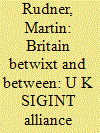

|
|
|
| 3 |
ID:
080331
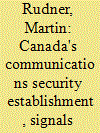

|
|
|
|
|
| Publication |
2007.
|
| Summary/Abstract |
Canada's Communications Security Establishment has undergone a far-reaching transformation in conjunction with the expanded role of Signals Intelligence in the global 'war on terror'. For the first time, Canada adopted a formal statute for CSE, including an expanded remit for countering terrorism. With a shift in targeting priorities towards terrorism and threats to Canadian interests abroad, Canada's participation in SIGINT-related international partnerships takes on new significance. The collection of communication intelligence touches upon public sensibilities regarding privacy rights of Canadians. The evolution of Canadian SIGINT capabilities was therefore accompanied by the establishment, as early as 1996, of a system for intelligence accountability and review, the Office of the CSE Commissioner. Recent advances in communications technology and pressing requirements for Signals Intelligence have impelled changes in the law, while also accentuating the role played by the CSE Commissioner in scrutinizing CSE activities to ensure compliance with ministerial authorizations and the laws of Canada
|
|
|
|
|
|
|
|
|
|
|
|
|
|
|
|
| 4 |
ID:
122912
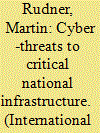

|
|
|
|
|
| Publication |
2013.
|
| Summary/Abstract |
Cyber attacks directed at Critical National Infrastructure constitute a significant, diverse, and rapidly escalating risk-element in the global threat environment. Critical infrastructures are susceptible to cyber attacks precisely because of their high inherent value and intrinsic vulnerabilities, coupled with a significant potential to inflict widespread harm on targeted countries. Threats to the cyber-security of critical infrastructures emanate from a wide spectrum of prospective perpetrators: state-sponsored espionage and sabotage, international terrorism, domestic militants, malevolent "hacktivists," or even disaffected insiders. Thus, British intelligence sources indicate that the United Kingdom is being bombarded by thousands of cyber attacks daily, perpetrated by hackers and state-sponsored organizations targeting government and business so as to steal secrets or disable networked computerized systems. 1 While criminal elements can also pose a threat to cyber-security, they tend to be motivated by material or financial benefit, whereas the focus here is exclusively on cyber-attacks perpetrated on Critical National Infrastructures to promote political or ideological objectives.
|
|
|
|
|
|
|
|
|
|
|
|
|
|
|
|
| 5 |
ID:
156145
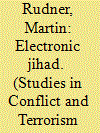

|
|
|
|
|
| Summary/Abstract |
The Internet has emerged as a key technology for Al Qaeda and other jihadist movements waging their so-called electronic jihad across the Middle East and globally, with digital multiplier effects. This study will examine the evolving doctrine of “electronic jihad” and its impact on the radicalization of Muslims in Western diaspora communities The study describes Internet-based websites that served as online libraries and repositories for jihadist literature, as platforms for extremist preachers and as forums for radical discourse. Furthermore, the study will then detail how Internet connectivity has come to play a more direct operational role for jihadi terrorist-related purposes, most notably for inciting prospective cadres to action; for recruiting jihadist operatives and fighters; for providing virtual training in tactical methods and manufacture of explosives; for terrorism financing; and for actual planning and preparations for specific terror attacks. Whereas contemporary jihadist militants may be shifting from the World Wide Web to social media, such as Facebook, YouTube, and Twitter for messaging and communications, nevertheless the Internet-based electronic jihad remains a significant catalyst for promoting jihadist activism and for facilitating terrorist operations.
|
|
|
|
|
|
|
|
|
|
|
|
|
|
|
|
| 6 |
ID:
095863


|
|
|
| 7 |
ID:
097780
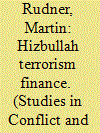

|
|
|
|
|
| Publication |
2010.
|
| Summary/Abstract |
Hizbullah, which has been designated a terrorist entity in several international jurisdictions, depends upon a substantial mobilization of financial resources to support its complex, multi-faceted organizational apparatus, its domestic activities in Lebanon, and its far-reaching transnational operations. This study surveys Hizbullah's resourcing requirements, and examines the role of military assistance from Iran and Syria along with Hizbullah's own reliance on front organizations, clandestine networks, business enterprises, propaganda media, and local exactions to generate funding for operational activities. Particular attention is directed at the diversion of charitable contributions, the exploitation of non-governmental organizations (NGOs), involvement in criminal activities and contraband trade, and the money laundering mechanisms utilized to transfer funds to where they are required. It also reviews efforts by international authorities to staunch the flow of financial resources to terror groups, activities and operations, including their effect on Hizbullah terrorism finance.
|
|
|
|
|
|
|
|
|
|
|
|
|
|
|
|
| 8 |
ID:
087556
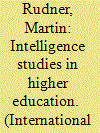

|
|
|
|
|
| Publication |
2009.
|
| Summary/Abstract |
Intelligence Studies as an academic discipline was slow to develop in universities. Perhaps the cause was the secrecy attaching to intelligence matters, or the reluctance of academe to engage with clandestine services, or the fear of being subverted by covert organizations, but universities in most countries seemed disinclined to embark on teaching or research programs relating to the Intelligence domain. A few universities, most notably in the United States, United Kingdom, Canada, Germany, and Israel, offered individual courses on intelligence Studies topics during the Cold War era, though mainly in the field of intelligence history.
|
|
|
|
|
|
|
|
|
|
|
|
|
|
|
|
| 9 |
ID:
080903


|
|
|
|
|
| Publication |
2008.
|
| Summary/Abstract |
The misuse of passports is intrinsically connected with international terrorism. Terrorist groups and their operatives demonstrate a propensity to travel in order to meet, organize, train, plan, reconnoiter targets, and deploy for attacks. To travel surreptitiously, terrorist activists and operatives typically make use of improperly obtained, altered, or counterfeit passports and visas. The present study addresses three key issues relating to the terrorist misuse of passports: (a) the role of passport misuse in the operational activities of international terrorist networks; (b) the ways in which terrorist elements acquire seemingly genuine passports; and (c) the various international covenants, agreements, and related action plans intended to constrain terrorists' ability to move surreptitiously across borders. The analysis describes a terrorism cycle, a complex array of key activities that together serve as enablers for international terrorism. The role of passports and surreptitious travel is examined for each stage of this terrorism cycle.
|
|
|
|
|
|
|
|
|
|
|
|
|
|
|
|
| 10 |
ID:
101289


|
|
|
|
|
| Publication |
2010.
|
| Summary/Abstract |
The two decades, 1925-45, witnessed a dramatic transformation and revitalization of the Persian carpet industry in response to developments in Iranian governance, society and economy. Two historical watersheds were covered by that period, notably the replacement of the Qajar dynasty by a modernizing administration under Reza Shah Pahlavi, and the subsequent wartime occupation of Iran jointly by the Soviet Union and Great Britain. It was during those two decades that Iran acquired a centralized system of government and the beginnings of a modern industrial base. The accompanying social transformation brought about the emergence of new classes of administrators and managers who constituted the dominant elite of the Reza Shah era. This twin process of centralization and modernization had a telling impact on Iranian culture and the arts, including the carpet arts.
|
|
|
|
|
|
|
|
|
|
|
|
|
|
|
|
| 11 |
ID:
094589


|
|
|
|
|
|
|
|